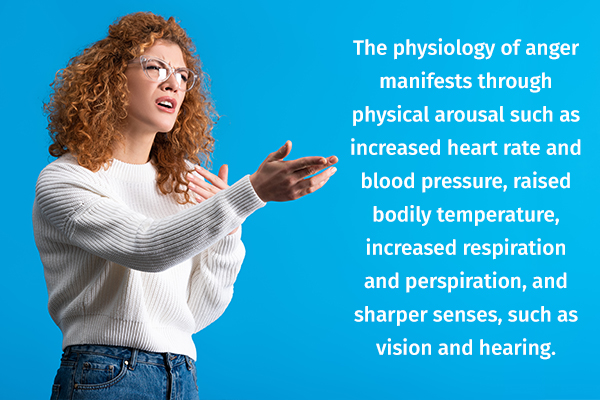In this article:
Anger is a natural and normative emotion, or affective state, that all human beings experience at one time or another and throughout evolutionary history. Anger is considered one of the four basic emotions: anger, sadness, happiness, and confusion/fear.

Notably, anger progresses from milder forms to more intense iterations, such as frustration and annoyance to rage. As a result, this emotional state can provide information about your values and the associated injuries to those values.
What Is Anger?
According to the American Psychological Association, “Anger is an emotion characterized by antagonism toward someone or something you feel has deliberately done you wrong.” (1)
Anger manifests itself in certain experiences and situations, especially if such situations or encounters with others move you away from your perceived sense of positive well-being. As a result, anger links your emotional world to cognition – or thinking world – and can serve as a motivator toward engaged and focused action.
Responding to anger also can lead to outward behavioral expressions that interfere with healthy relationships and navigating your environments in adaptive ways. In other words, anger can direct your actions in either a positive or destructive direction.
Biological Mechanism Involved in Anger

When one feels anger, the amygdala – the brain structure in the limbic system that is in charge of emotion – galvanizes the sympathetic nervous system branch of the autonomic nervous system, thus activating the “fight or “flight” response in the brain to move toward action.
Once faced with an external stimulus or situation, the brain evaluates and processes the information experienced in that environment. As a result, for many, the hormones cortisol and adrenaline are released from the interaction of several brain structures called the hypothalamic-pituitary-adrenal (HPA) axis.
Anger can emerge when that evaluation identifies a perceived hostile threat, minor or powerful. That threat may be to the emotional self, the physical body, or another person. The threat may be real, but it could also be imagined.
When the body is flooded with these hormones, anger is experienced in various ways and through varied senses. For example, the physiology of anger manifests through physical arousal such as increased heart rate and blood pressure, (2) raised bodily temperature, increased respiration and perspiration, and sharper senses, such as vision and hearing.
Useful Guidelines for Anger Management

Here are some tips to channel or tame your anger in productive ways:
- Pinpointing when you feel angry and what triggers it provides clues to what occurrences in your environment may be troubling. Writing down through journaling your experiences of anger allows openings for self-reflection. With this recognition, you can create a space for reasoning and further evaluation, and determination of actions can occur.
- Another strategy is to utilize the body scan activity. Attend to where anger shows up in your body. Draw your attention to that area or areas of the body, tense the area, and then relax. Attending to the physical tension that anger elicits can lead to not only a physical discharge but also an emotional one.
- Anger for some may physically reverberate throughout the body, fully activating the autonomic nervous system. Engaging in physical activity, such as aerobic exercise, decreases the expression of anger in both adolescents and adults. (3) Some such exercises include brisk walking, cycling, swimming, and running.
- Mindfulness meditation is an additional method to decrease autonomic arousal by focusing the attention on the breath, a word, or a phrase. This form of meditation includes allowing thoughts to come and go without applying judgment, but connecting to the present moment and creating space to choose your next action.
- Deep diaphragmatic breathing may go hand in hand with meditation but could also be done alone. Breathing rhythmically and deeply decreases autonomic arousal and generates access to more purposeful and adaptive coping skills. (4) Many online resources provide deep breathing strategies, such as using the square breath exercise. This exercise involves inhaling deeply through the nose for a slow count of four seconds, followed by holding the breath for an additional four seconds, then exhaling through the mouth slowly for four seconds, and then holding the breath again for the last four seconds. The cycle is repeated slowly several times in a row. This breathing exercise enhances calm and a return to a healthier emotional baseline.
- Cognitive-based therapies focus on helping clients understand the thoughts that drive their responses to anger and then creating opportunities for developing alternative perspectives to situations. (5) For example, if someone has a chance encounter with a colleague during a meeting, the associated thought might emerge, “He thinks I’m incompetent? What a moron!” Psychologists and other therapists assist clients in evaluating situations more broadly and can offer alternative viewpoints, such as, “Perhaps he misunderstood my comment. I’ll check in with him to make sure he understands fully.”
- For some, hormonal dysregulation may contribute to difficulties coping with angry feelings. Following healthy eating habits, staying hydrated, getting restful and enough sleep may help. Hormonal support from a physician, once evaluated medically, may support these individuals in increasing access to more effective coping when feeling angry.
- When you get angry, sometimes clear thinking fades along with appropriate verbal expression. Assertive communication training serves as an opportunity to learn and practice conflict resolution skills without resorting to aggressive or confrontational verbal or physical interactions. (6)
- If your anger expression moves toward significantly destructive behaviors to self or others, seek professional help from a licensed clinician with specific training in anger-management skills development.
A combination of all of these strategies with routine practice may not remove anger from your experience of emotions but can direct you to acknowledge that the feeling of anger does and will happen, is connected to signals to and from your brain, and provides the opportunity to engage in focused constructive behavioral responses.
Physical and Mental Health Problems Associated With Long-Term Anger
Anger, when pervasive, correlates with negative short-term and long-term health outcomes.
The causal effects of anger on the cardiovascular system are still not clearly understood, (7) although studies suggest significant and positive correlations between anger and cardiovascular disease, digestive issues, and sleep disturbances, such as insomnia. (8)
The psychological impact of chronic anger can contribute to depression, anxiety, (9) and loneliness resulting from damaged interpersonal relationships from possible outward expressions of anger, such as hostility and aggression toward self and/or others.
However, anger does not have to control your existence or how you live your life. You can effectively learn ways to mitigate its negative effects while opening yourself to your full range of emotions.
Final Word
Anger is not a “bad” emotion. It is just an emotion – one that surfaces from the interactions of your thinking and your environment.
With the strategies mentioned in this article, both behavioral and cognitive, you can choose to embrace anger as one of the many human emotions that have evolved with humans over time without getting swept up or blinded by it.
You can experience it fully, step back from it, and choose how you want to engage in your life differently or in a healthy and more meaningful way.
- Was this article helpful?
- YES, THANKS!NOT REALLY


